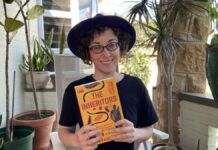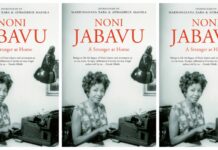Muslim, American, Pakistani-Kashmiri, poet, writer – in her debut poetry collection, Fatimah Asghar reflects on navigating those identities through questions of race, history, sexuality, and nationality. If They Come For Us – released in 2018 – is a beautiful book filled with thought-provoking and reflective work. FATIMA MOOSA spoke to Asghar about her work and more.
As an established touring poet, screenwriter and performer, Asghar’s work has appeared in many magazines and journals, and news outlets. She is also a writer and co-creator of Brown Girls, an Emmy-nominated web series that focuses on friendships between women of colour. Asghar was also featured on the Forbes 30 Under 30 list.
Reading If They Come For Us will leave you feeling hollow inside but more fuller as well. It’s simultaneously beautiful and heartbreaking. With poems ranging in content from the deeply personal to shared experiences, it is a wonderful exploration of what it means to be a brown immigrant woman. It is about reconciling with a traumatic past while sending out a marked warning about what happens when history is not respected and repeats.
On the phone from the United States, Asghar says that identity is something that influences everything she writes and informs all of her art. “It’s impossible for me to divorce my identity from my experiences. When I walk around people see my race, they see my gender. When I interact with people, my sexuality comes into play,” she says. Identity is a filter she adds for how people see each other: “It’s really important in my work because there isn’t really a way in our society in which any of us exist without our identity,” Asghar says.
The Partition was an important event which saw colonial British India divided by the colonialists in 1947 into India, Pakistan and Bangladesh. The move displaced millions of people along religious lines – and the violent nature of the partition created a lasting atmosphere of fear, suspicion, and hostility between India and Pakistan. It is this major historical event which plays a huge part in Asghar’s poetry collection.
She says her work allows her to think about historical legacies and what we are and aren’t taught about our histories. “It’s really important to me that we keep those histories alive and in conversation, and we show the ways that those histories continue to impact us beyond just a certain moment or year,” she says. Asghar says she goes beyond just thinking about it as an event: “But the Partition as a historical legacy and trauma continues to affect South Asian people across the world. It’s important to me that those kinds of histories are not lost and neither is the way they continue to have an impact,” she says.
Asghar’s book goes beyond just being about good poetry but – also makes the reader feel things in all the richness that the emotions demand. She says that she wants people reading her book to feel connected and that’s why she makes all of her art. “In my book, I want people to feel a certain kind of nuanced humanity, and feel that to themselves, towards me, and towards the world.”
The title of the book comes from a poem of the same title. It is a beautiful and heartbreaking poem about how she sees herself in all the people around her and how it all the people – from the taxi uncle to the aunty in the park – who make up what it means to be American. Asghar says she wrote it after Donald Trump became the president of the United States as a pledge of the beauty of people of marginalised identities and an awareness of the threat being faced.
“Realising the real threat and not just felt because of Donald Trump but that had been felt for a long time of the government not caring about people of marginalised identities and feeling that if they come for us, they come for you, they come for me and what does it mean to recognise that threat and see our beauty and our linked humanity and we are going to stand up for each other,” she says.
As a creative woman of colour (WOC), Asghar says she is fully aware that people constantly want WoC to constantly be entertaining and have an input. She says it’s okay for WoC to take time and find your voice even when it feels like there could be repercussions from family and society. “There are real stakes when women of colour say what they need to say and put out their art. Part of it is remembering you are not on anybody else’s timeline. Your stories are yours and you are allowed to share them with who you want and also you don’t have to share them with who you don’t want,” she says.
A lot of those conversations have to do with erasure. Asghar says that many people just don’t know who South Asian people and women specifically are as complicated people. “White people really get to have a complicated humanity. I think what happens is as women of colour and people of colour we often don’t get to have that. It’s really important to allow each other this space to have those real and complicated humanities.” she says.
In a world that is constantly trying to make women of colour into something that are not, Asghar says WoC shouldn’t put themselves into a situation where they are forced to say something they don’t want to or need to.
“If the rest of the world isn’t going to protect you then you have to protect yourself and you have to find the people who will protect you,” she says.









